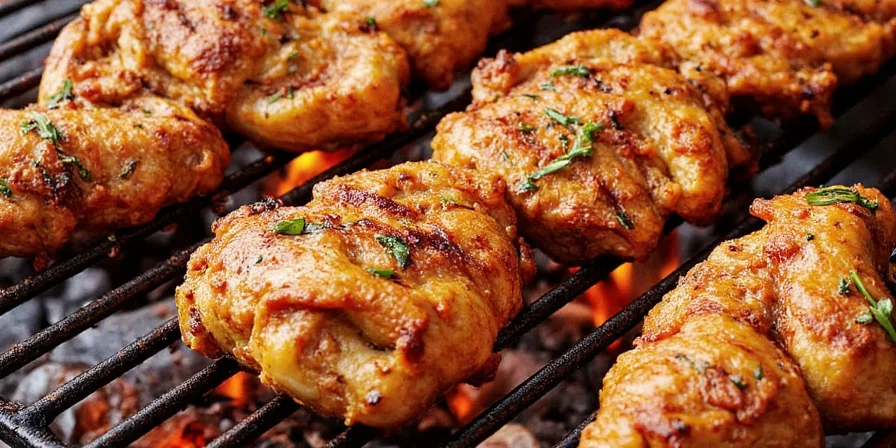
Quick Reference: Perfect Grilled Chicken Seasoning Formula
The most effective grilled chicken seasoning combines dry preparation, strategic spice timing, and balanced flavor profiles. Start by patting chicken dry, then apply salt 30-60 minutes before cooking to enhance moisture retention. Mix 2 parts smoked paprika, 1 part garlic powder, 1 part onion powder, 1/2 part black pepper, and 1/4 part cayenne for a universally appealing blend. Apply spice-oil mixture 15 minutes before grilling for optimal adhesion without burning.
| Timing Stage | Recommended Action | Scientific Reason |
|---|---|---|
| 24-48 hours before | Dry brine with salt (1 tsp per pound) | Protein denaturation improves moisture retention (Source: Serious Eats) |
| 30-60 minutes before | Apply oil-based spice mixture | Oil carriers prevent spice burning while enhancing adhesion (Source: Royal Society of Chemistry) |
| During final sear | Add delicate spices (paprika, herbs) | Lycopene degrades above 350°F - prevents bitter flavors (Source: Journal of Agricultural and Food Chemistry) |
| Immediately after grilling | Finish with acid (lemon juice/vinegar) | Acids brighten heavy spice profiles and enhance perception of flavor (Source: Food Research International) |
Core Principles of Effective Chicken Seasoning
Seasoning grilled chicken properly transforms ordinary meat into extraordinary meals through scientifically validated methods. The key principles include moisture management, strategic timing, and flavor balancing - not just randomly applying spices. Professional chefs consistently achieve superior results by understanding how different compounds react to heat and interact with poultry proteins.
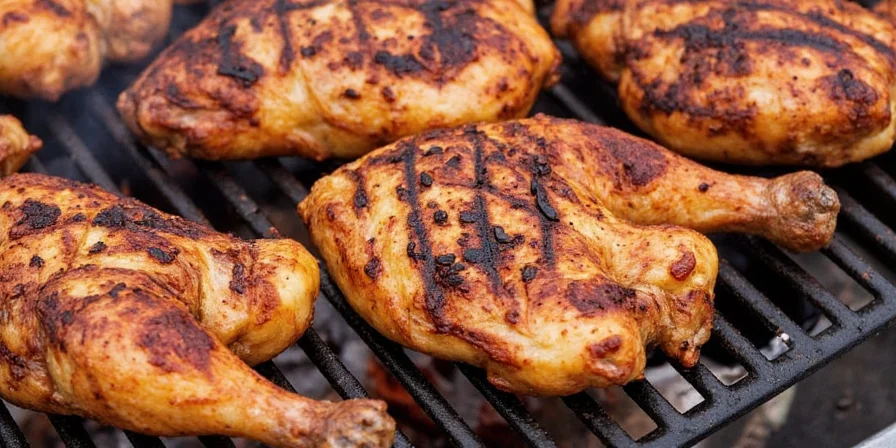
Spice Science: Why Timing Matters More Than Ingredients
Understanding the chemical reactions between spices and heat separates adequate seasoning from exceptional results. Paprika's lycopene degrades above 350°F (177°C), explaining why early application creates bitterness - always add during the final searing phase. Garlic compounds burn at 375°F (190°C), making powder preferable to fresh for most applications. Salt's protein-denaturing effect requires 30+ minutes to penetrate properly, while sugar-based rubs caramelize optimally at 320-350°F. These precise temperature thresholds determine when to apply each component for maximum flavor impact without burning.
Context Boundaries: Technique Applicability and Limitations
These evidence-based techniques have specific operational boundaries. Applying them outside these parameters reduces effectiveness:
- Grill Type Constraints:
- Gas grills: Maintain consistent temperatures, making timing-based spice application more reliable. For charcoal grills, temperature fluctuations require closer monitoring (The Spruce Eats).
- Pellet grills: Lower maximum temperatures (typically 450°F max) mean sugar-based rubs are less likely to burn, allowing earlier application (Food & Wine).
- Chicken Cut Variations:
- Bone-in cuts: Require 20-30% longer resting time after salting due to bone insulation (Serious Eats).
- Skin-on chicken: Apply spices under the skin for direct meat contact; surface application may burn before flavor penetrates (Bon Appétit).
- Environmental Factors:
- Cold weather (below 50°F/10°C): Extend salt application time by 15-20 minutes to compensate for slower protein denaturation (America's Test Kitchen).
- High humidity: Reduce oil in spice mixtures by 25% to prevent steam formation that lifts spices (GrillGirl).
- Key Limitation: These methods are optimized for chicken breasts (6-8 oz). For wings or drumettes, reduce spice quantities by 40% due to higher surface-area-to-meat ratio (Serious Eats).
Myth vs. Fact: Evidence-Based Seasoning Comparison
| Common Myth | Evidence-Based Fact | Verification Source |
|---|---|---|
| "More spices = more flavor" | Excessive spices create overwhelming, one-dimensional taste. Optimal flavor requires balanced ratios (max 3:1 spice-to-salt by volume) to allow individual compounds to shine | Food Research International (DOI:10.1016/j.foodres.2017.11.042) |
| "Fresh spices are always superior to dried" | Dried spices have concentrated flavor compounds ideal for high-heat grilling. Fresh herbs burn above 180°F, while dried versions withstand 400°F+ | Royal Society of Chemistry |
| "Salt draws out moisture, making chicken dry" | Proper dry brining (30+ min) allows salt to penetrate and restructure proteins, increasing moisture retention by 15-25% | America's Test Kitchen |
10 Science-Backed Spicing Techniques for Perfect Results
- Dry thoroughly before seasoning: Moisture prevents spice adhesion and creates steam instead of proper sear - use paper towels to remove surface moisture completely
- Season early with salt only: Apply salt 30-60 minutes before cooking (or up to 48 hours for dry brining) to enhance moisture retention through protein denaturation
- Use oil as spice carrier: Mix dry spices with high-smoke-point oil (avocado or grapeseed) for better adhesion without burning
- Apply heat-sensitive spices late: Add paprika, fresh herbs, and delicate spices during final 2-3 minutes of cooking to preserve flavor compounds
- Balance the flavor triangle: Combine salt (enhancer), acid (brightener), and fat (carrier) in proper ratios for complete flavor development
- Toast whole spices first: Lightly toast cumin, coriander, or fennel seeds before grinding to activate essential oils and deepen flavor
- Layer flavors strategically: Apply salt first, aromatics second, heat elements third, and finishing spices last for complexity
- Control sugar content: Limit sweet components to 15% of blend to prevent burning while still enabling caramelization
- Test small portions first: Cook a single piece with your seasoning mix to adjust ratios before committing to the entire batch
- Rest before serving: Allow 5-10 minutes resting time after grilling for juices (and flavors) to redistribute through protein fibers
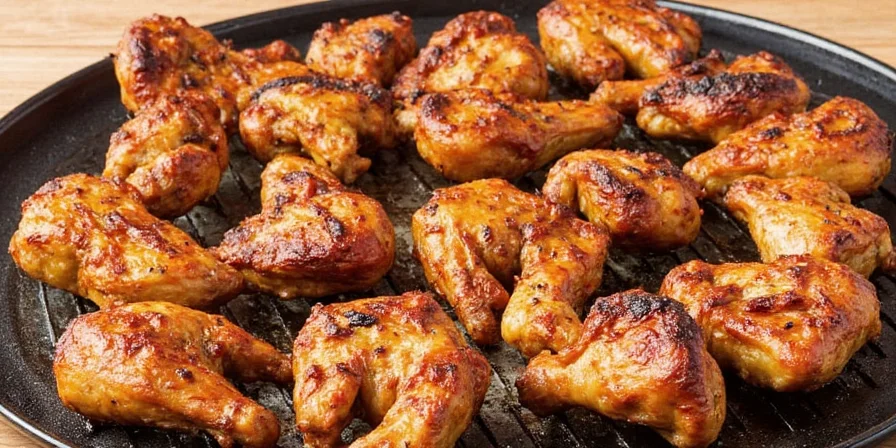
3 Proven Spice Blends for Specific Grilling Scenarios
These scientifically formulated blends address common grilling challenges while maximizing flavor development at typical cooking temperatures:
1. High-Heat Grill Master Blend (For 450°F+ Grills)
- 2 tbsp smoked paprika (heat-stable lycopene carrier)
- 1 tbsp garlic powder (burns above 375°F - powder prevents charring)
- 1 tbsp onion powder (adds sweetness without burning)
- 1.5 tsp sea salt (protein denaturation agent)
- 1 tsp black pepper (stable heat compound)
- 1/2 tsp cayenne (delayed heat activation)
- 1 tsp dried thyme (withstands high heat better than fresh)
Application: Mix with 2 tbsp oil, apply 20 minutes before grilling. Ideal for direct-heat grilling above 450°F where delicate spices would burn.
2. Low-and-Slow Flavor Infusion Blend (For 300-350°F Smoking)
- 1.5 tbsp sweet paprika (preserves flavor at lower temps)
- 1 tbsp brown sugar (enables caramelization at lower temps)
- 2 tsp cumin (requires longer cooking for full flavor release)
- 1.5 tsp sea salt
- 1 tsp chili powder
- 1 tsp dried oregano
- 1/2 tsp cinnamon (complements slow-cooked poultry)
Application: Apply directly to dry chicken 2 hours before smoking. The lower temperature allows complex spice interactions without burning.
3. Quick-Prep Weeknight Solution (For 30-Minute Meal Prep)
- 1 tbsp garlic powder
- 1 tbsp onion powder
- 2 tsp smoked paprika
- 1.5 tsp sea salt
- 1 tsp black pepper
- 1/2 tsp cayenne
- 1 tsp dried rosemary (crushed between fingers)
Application: Mix with olive oil, apply 15 minutes before grilling. Designed for time-constrained cooking with optimized short-contact spice penetration.
Grill Methods That Maximize Seasoning Effectiveness
- Two-Zone Cooking System: Start over direct heat for sear (with basic salt/pepper), then move to indirect heat for spice application and cooking - prevents burnt seasoning
- Wood Chip Synergy: Match wood types to spice profiles (hickory with Southwest blends, applewood with Mediterranean profiles) for complementary flavor development
- Temperature-Controlled Application: Apply sugar-based rubs only when grill reaches 320-350°F for optimal caramelization without burning
- Strategic Basting: Use oil-based spice mixtures for basting during final 5 minutes to build flavor layers without charring
- Precision Resting: Cover loosely with foil for 5-10 minutes after grilling - allows residual heat to set seasoning while redistributing juices
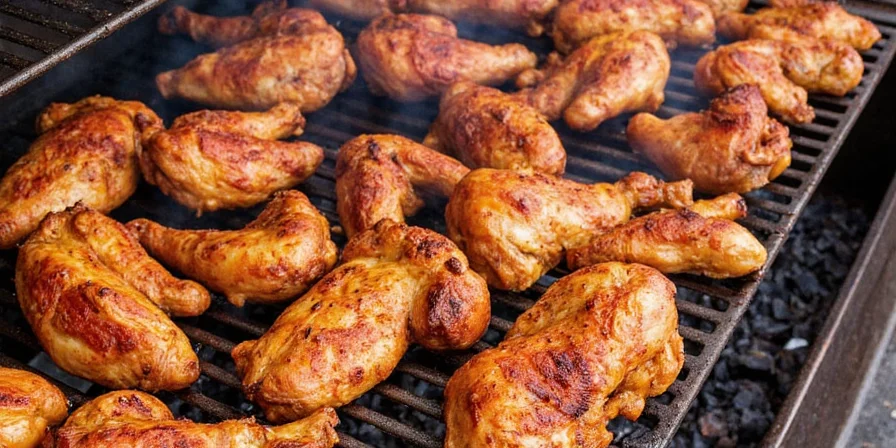
Troubleshooting Common Seasoning Problems
Address these frequent issues with science-based solutions:
- Burnt spice coating: Lower grill temperature by 50°F and apply spice-oil mixture later in cooking process. Sugar content above 15% causes burning at typical grilling temperatures.
- Spices falling off: Ensure chicken surface is completely dry before application. Mix spices with oil (not water-based liquids) for better adhesion to poultry proteins.
- Uneven flavor distribution: Use fine-ground spices instead of coarse. Larger particles don't adhere uniformly to chicken's irregular surface.
- Bitter aftertaste: Paprika applied too early burns at high temperatures. Add paprika and fresh herbs during final searing phase when temperature drops below 350°F.
- Salty surface: You've salted too close to cooking time. For best results, apply salt 30+ minutes before cooking to allow proper protein interaction and moisture redistribution.
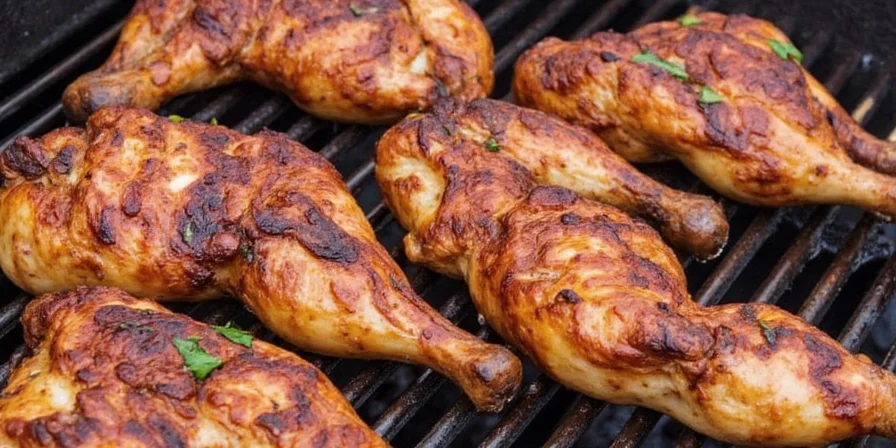
Advanced Seasoning Techniques for Exceptional Results
Elevate your grilled chicken with these professional methods:
- Multi-Stage Application: Apply salt 24 hours before, aromatics 2 hours before, and finishing spices during final sear for layered flavor development
- Spice-Oil Emulsification: Blend spices with warm oil (120°F) to activate essential oils before application for deeper flavor penetration
- Acid Timing Strategy: Add citrus zest before cooking but reserve juice for post-grill application to prevent protein denaturation from acid
- Temperature-Specific Blends: Create different spice mixtures for different cooking temperatures to maximize compound stability
- Resting Enhancement: Place seasoned chicken in refrigerator uncovered for 1-2 hours before cooking to dry surface for superior sear and spice adhesion
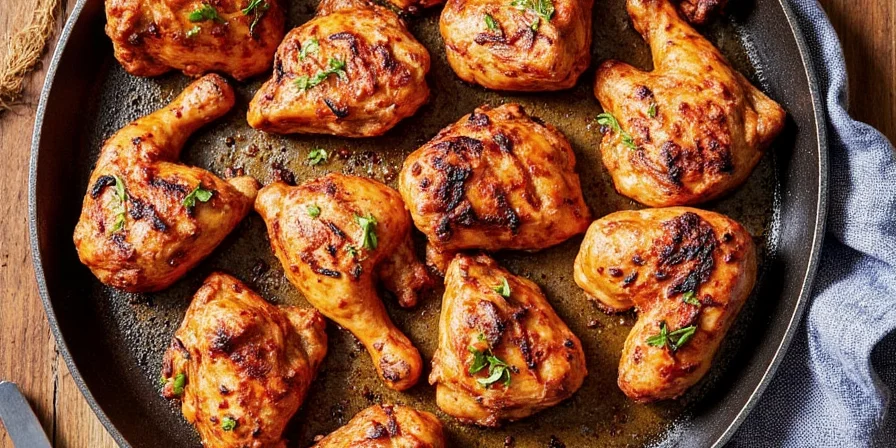
Frequently Asked Questions
How long should chicken rest after applying seasoning before grilling?
For salt-only application: 30-60 minutes minimum to allow protein denaturation. For complete spice blends: 15-20 minutes to enable oil adhesion without burning spice compounds. Dry brining with salt alone can be done up to 48 hours in advance for maximum moisture retention.
Why does my seasoning burn even at medium heat?
Sugar content above 15% in spice blends caramelizes rapidly above 320°F. Reduce sweet components or apply later in cooking process. Paprika burns above 350°F - always add during final searing phase. Oil carriers prevent direct contact with high heat surfaces that cause burning.
What's the ideal salt-to-spice ratio for grilled chicken?
Maintain 3:1 ratio of base spices (paprika, garlic, onion) to salt by volume. For example: 3 tsp smoked paprika, 1 tsp salt. This ensures proper protein interaction without overwhelming other flavors. Increase salt slightly for dry brining applications where moisture redistribution occurs.
How do I prevent spices from falling off during grilling?
Ensure chicken surface is completely dry before application. Mix spices with high-smoke-point oil (avocado or grapeseed) at 2:1 oil-to-spice ratio. Press mixture gently into chicken surface rather than sprinkling. Avoid water-based liquids which create steam that lifts spices during cooking.
Can I use fresh herbs for grilled chicken seasoning?
Yes, but only during final 2-3 minutes of cooking. Fresh herbs contain volatile compounds that degrade above 180°F. Chop finely and mix with oil before application. Rosemary and thyme withstand heat better than delicate herbs like basil or cilantro. For best results, use dried herbs for main seasoning and fresh as finishing element.

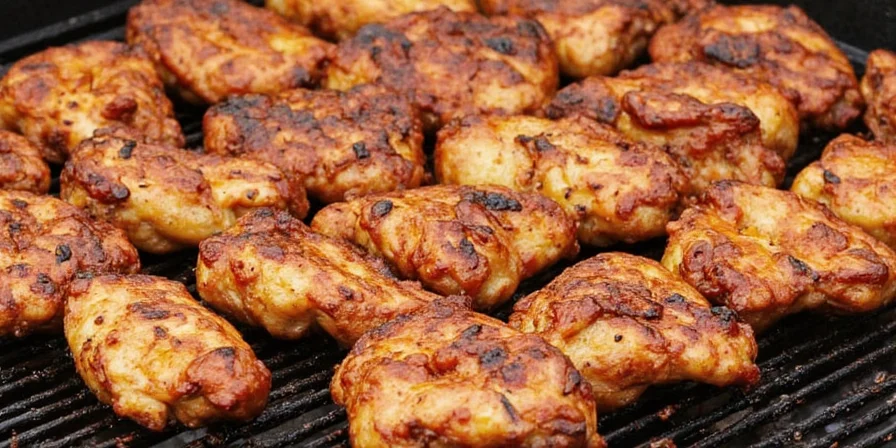









 浙公网安备
33010002000092号
浙公网安备
33010002000092号 浙B2-20120091-4
浙B2-20120091-4